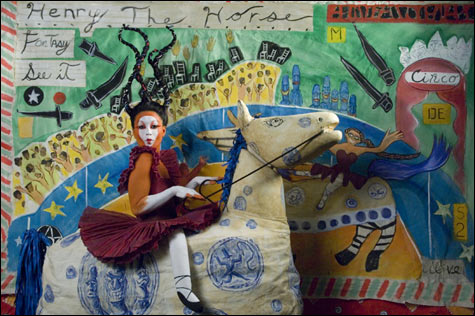
ACROSS THE UNIVERSE: Is this the Beatles world we’d all like to think we live in? |
Peter’s Five Most Overrated Films Likely To Receive Awards All the Same:
1. Juno
2. Into the Wild
3. The Kite Runner
4. No End in Sight
5. Lars and the Real Girl |
From the murder of an underage Ukrainian sex slave in Eastern Promises to the family carnage in Before the Devil Knows You’re Dead, the best films of 2007 hold their own when it comes to despair, evil, and treachery. So am I being a cockeyed optimist in thinking they also offer a glimmer of hope? Maybe the unabashed exuberance of Across the Universe has checked my usual cynicism, or the dogged vindication of courage and the imagination in Le scaphandre et le papillon|The Diving Bell and the Butterfly. Or maybe it’s the assurance that, despite the odds, great films still get made.1. Le scaphandre et le papillon|The Diving Bell and the Butterfly
Julian Schnabel admires artists who overcome adversity. Like Jean-Dominique Bauby, a Parisian journalist who suffered a stroke that left him paralyzed except for one eye — he wrote the memoir on which this film is based by blinking out the words in code. Most directors would be content with the pathos. Schnabel looks deeper: his subtle use of point of view and poetic images and an overwhelming performance by Mathieu Amalric illuminate the conflict, the tragedy, the terror, and the triumph.

2. Across the Universe
What would the world be like with Beatles music but no Beatles? Would the songs spring from the lives and the subconscious of common people? That would be the perfect movie musical, and Julie Taymor comes close to pulling it off, as when “Happiness Is a Warm Gun” transforms a veterans’ hospital into a zoetrope aswirl with brutal images of ‘60s conflict. Across the Universe brims with creativity — what the world was like with Beatles songs and the Beatles.
3. The Bourne Ultimatum
Arty Paul Greengrass made the best action film of 2007. Jason Bourne (Matt Damon) suffers from amnesia and a guilty conscience; he’s killed, but he doesn’t know why or for whom, and neither does he know who he is. To find out, he hopscotches around the world, kicking ass and taking hits. Greengrass shot this in long takes with a handheld camera, creating a chaos with just enough clarity to let you figure it out. Kind of like Bourne himself, who suspects that the truth might set him free, but not from responsibility.
4. Red Road
Andrea Arnold’s film observes a world where even isolation has lost all humanity, where obsession, degradation, and violence are the price of making contact. It’s also an affirmation of courage and desire. A cop assigned to the Glasgow CCTV department spends the day spying on every back alley in town until an image stirs her memory, or maybe her imagination. What results draws on the lust and loss throbbing behind images. In a world where contact and betrayal converge, where public and private are the same and nothing, redemption can start with a TV screen.
5. Eastern Promises
Eastern Promises begins with uncanny images of birth and death, equally raw and bloody. As in A History of Violence, the plot is tightly wrapped and full of surprises, and David Cronenberg unfolds it with the resignation, efficiency, and grace of Viggo Mortensen’s performance as an enigmatic and ruthless member of the Russian mob in London. The film slashes a fraction as many throats as does Sweeney Todd, but the payoff is many times greater. Like the tattoos, the beauty and the terror are more than skin deep.
6. Before The Devil Knows You’re Dead
Sidney Lumet may be 83, but his latest film makes Quentin Tarantino look geriatric. In fact, Lumet beats Tarantino at his own game, devising a Rubik’s Cube of intersecting, backtracking, reverse-angled story lines. Moreover, he and his actors have created characters of monumental moral feebleness and ineffectual rapacity who are engaged in folly as old as the family unit. The climax of Devil unrolls with the inescapable majesty of a building collapse, but most of the pleasure lies in watching Lumet set the pieces up only to knock them down.
7. Zodiac
David Fincher cuts out the flash of his previous movies (Fight Club, for one) and reduces this one to the basics of a grimy character surrounded by clues scratching his head. The Zodiac killer terrorized the San Francisco area through the ‘60s and ‘70s, taunting the police with coded notes — but Zodiac is interested less in him than in the people who’re determined to track him down. The film isn’t about killing so much as it is about time: how time passes while we try to make sense of past time.